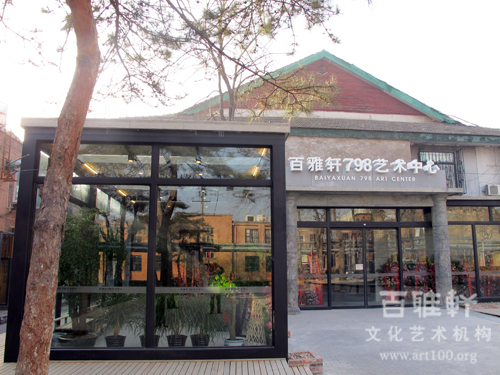|

【專題】 羅爾純繪畫展
百雅軒是中國領先的藝術家推廣機構和藝術品運營機構。由李大鈞先生創辦于2003年。致力于推廣中國最有價值和最有潛力的藝術家的藝術,致力于建立面向世界的頂級藝術資源和藝術品整合運營平臺,致力于藝術產業化創新實踐。其核心業務涉及連鎖畫廊、藝術授權、版畫出版、藝術傳播、藝術基金、藝術品投資顧問、藝術衍生品、藝術沙龍等領域。百雅軒百雅軒798藝術中心是百雅軒文化藝術機構直屬部門,是百雅軒連鎖畫廊計劃的旗艦畫廊。2010年12月18日開幕。位于北京798藝術區中心區北部一座完整的歷史建筑。該建筑于1954——1957年由德國包豪斯學派的建筑機構援助設計建成,曾經是該地區718聯合廠(798前身)公共大食堂和活動禮堂,是798藝術區屈指可數的標志型建筑。
百雅軒798藝術中心將立足于“經典”與“創造”,“多元”與“開放”,“主體”與“主場”的價值定位,致力于打造成為中國當代的重要藝術推廣平臺和有影響力的藝術市場陣地,致力于中外文化交流和藝術產業化的創新實踐。
百雅軒798藝術中心的裝修改造工程由王懷慶、劉巨德等藝術家精心設計指導,建成為一座內外環境俱佳的現代藝術展廳。展廳中心層高8米,跨度20米,縱深80多米,中心展覽大廳面積達700多平米。部分區域經改造為兩層展廳,展廳總面積2000多平米,適合舉辦大型展覽和活動。除了藝術展廳,還辟有藝術品商店、咖啡廳、會議室、閱覽室等功能區。

Baiyaxuan 798 Art Center
Baiyaxuan 798 Art Center is directly affiliated to Baiyaxuan Art & Cultural Institute and is a flagship gallery of Baiyaxuan’s program of chain galleries. Opened on December 18, 2010, Baiyaxuan 798 Art Center is located at an intact historical building in the northern part of Beijing 798 Art Zone. The building, constructed with assistance by architectural institution of German Bauhaus school, was previously public communal dining hall and auditorium of 718 Joint Factory (predecessor of 798 Art Zone) and is one of the few landmark buildings in 798 Art Zone.
Baiyaxuan 798 Art Center, based on the value orientation of being "subject" & "venue", "classic" & "creative" and "diversified" & "open", is committed to building an important art promoting platform and influential art market position in Contemporary China and is devoted to domestic and foreign cultural exchange and innovative practice of art industrialization.
Baiyaxuan 798 Art Center, whose fitment and reconstruction project was designed with the guidance of such artists as Wang Huaiqing and Liu Jude, is a modern art exhibition hall with excellent interior and exterior conditions. The exhibition hall, with height of 8 meters, span of 20 meters and vertical depth of more than 80 meters, covers a total area of over 2,000 sq. meters. The central exhibition hall covers an area of more than 700 sq. meters, and some other sections of the hall have been reconstructed into two-storey exhibition hall, which are available for large-scale exhibitions and activities. In addition to art exhibition hall, the building involves such functional areas as art shop, cafe, meeting room, reading room, etc.
|